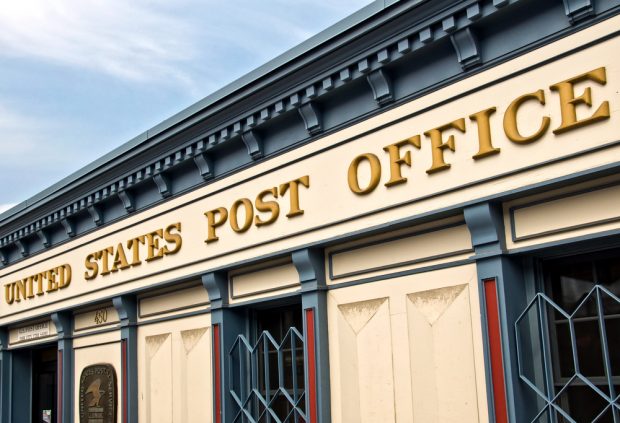 U.S. Post Office (Image: Shutterstock).
U.S. Post Office (Image: Shutterstock).
It's back.
Or, maybe it never left.
Recommended For You
Postal banking once again has emerged as an issue in the race for the Democratic nomination for president.
No fewer than four of the 2,156 Democratic candidates for president (OK, maybe that's a slight exaggeration) favor allowing post offices to provide some sort of banking services.
There may be more than that, but four have publicly talked about their position so far.
Credit union trade groups have opposed postal banking since dinosaurs roamed the earth (OK, that's another slight exaggeration).
This year, so far, Democratic presidential candidates Sens. Elizabeth Warren of Massachusetts, Bernie Sanders of Vermont and Kirsten Gillibrand of New York have pushed for some form of postal banking.
And on the House side, Democratic Rep. Tim Ryan (D-Ohio) has endorsed it.
Yes, they're all members of Congress, but those folks are among the candidates with public positions on a variety of issues.
Several of the candidates have been pushing legislation that simply would allow the Postal Service to provide basic banking services.
Warren's proposal might be much more palatable to the credit union industry.
The senator's banking regulation plan, most of which is targeted toward Wall Street, a favorite target of hers, calls for allowing the U.S. Postal Service to partner with local community banks and credit unions to provide basic banking services.
Credit unions have long argued that the best way to provide banking services in underserved areas – the main goal of the postal banking advocates – would be to simply allow credit unions to provide the services.
Democrats included postal banking in their official 2016 platform in the presidential campaign, but political platforms are generally ignored.
And the unions representing postal workers have long advocated for postal banking.
Of course, it does have some powerful opponents, including the banking industry.
And the Trump Administration and congressional Republicans.
Postal banking might never be enacted, but it appears that as an issue, it may never go away.
Was That You?
That's the question the Government Accountability Office is going to ask 10,000 random commenters on various federal rules.
As I reported in June, each side of the payday lending fight has accused the other of submitting boilerplate comments on a CFPB proposal.
And implied that some of the comments might be downright phony.
For instance, Allied Progress, an opponent of loosening the agency's strict payday rules, said of the thousands of commenters opposing the rule, at least 214 said they had used loan proceeds to pay for a new hot water tank.
And, using the exact same language, more than 200 said they had used their payday loans for childcare services.
On the other side of the issue, the Community Financial Services Association of America, the trade group for payday lenders, accused Allied Progress and others of being hypocrites since their websites featured portals that allowed commenters to submit comments opposing the loans.
The GAO wants to get to the bottom of the issue.
It announced in June that the office plans to send an email survey to more than 10,000 people who "are believed" to have provided comments on federal rulemaking.
"This email survey is part of an effort to better understand how public comments on proposed rulemakings are submitted to federal agencies, and especially the extent to which the comments submitted electronically are actually from those who are listed as having submitted them," the GAO said.
"This is an unprecedented survey for GAO; we want to be sure the public is aware we are conducting such a survey, given the large numbers of people who will receive it. Their answers will help form the basis for a GAO report to Congress in 2020 on the public comment process," Comptroller General Gene Dodaro said. "The information being gathered has the potential to improve how federal rules are developed. It's crucial to have as many survey responses as possible, and we are very grateful to members of the public who take the time to respond."
To conduct the survey, the GAO will choose a sample of comments submitted to federal agencies between 2013 and 2017. The GAO survey will include two questions asking whether the commenter submitted the comment with their email address.
Whether all those folks reporting that they needed hot water tanks actually needed them remains to be seen.
Harper's New Counsel
You gotta wonder how well the appointment of Catherine Galicia as NCUA board member Todd Harper's senior policy counsel was received in the halls of credit union trade groups.
Galicia comes with stellar credentials that may cause some credit union folks a great deal of indigestion.
Galicia helped draft the consumer protection sections of Dodd-Frank. Of course, those sections include the CFPB and credit union trades are no big fans of the agency.
And she helped shepherd the confirmation of CFPB Director Richard Cordray through the Senate.
We know what credit unions thought of Cordray. The trades repeatedly asked him to exempt credit unions from agency rules and he refused.
And then, Galicia went to work for the CFPB as its assistant director for legislative affairs.
So far, during the two meetings in which Harper has served on the board, he has grilled agency officials on various issues.
And that's likely to continue.
If one thing is clear, it's that the days of 15-minute NCUA board meetings have ended.
 David Baumann
David Baumann David Baumann is a correspondent-at-large for CU Times. He can be reached at [email protected].
© 2025 ALM Global, LLC, All Rights Reserved. Request academic re-use from www.copyright.com. All other uses, submit a request to [email protected]. For more information visit Asset & Logo Licensing.







